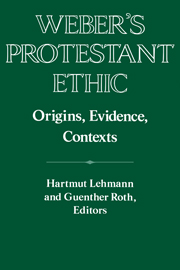Book contents
- Frontmatter
- Introduction
- Part I Background and Context
- 1 The German Theological Sources and Protestant Church Politics
- 2 The Thesis before Weber: An Archaeology
- 3 Max Weber, Protestantism, and the Debate around 1900
- 4 Weber the Would-Be Englishman: Anglophilia and Family History
- 5 Weber's Historical Concept of National Identity
- 6 Nietzsche's Monastery for Freer Spirits and Weber's Sect
- 7 Weber's Ascetic Practices of the Self
- 8 The Protestant Ethic versus the “New Ethic”
- 9 The Rise of Capitalism: Weber versus Sombart
- Part II Reception and Response
- Index
7 - Weber's Ascetic Practices of the Self
Published online by Cambridge University Press: 05 January 2013
- Frontmatter
- Introduction
- Part I Background and Context
- 1 The German Theological Sources and Protestant Church Politics
- 2 The Thesis before Weber: An Archaeology
- 3 Max Weber, Protestantism, and the Debate around 1900
- 4 Weber the Would-Be Englishman: Anglophilia and Family History
- 5 Weber's Historical Concept of National Identity
- 6 Nietzsche's Monastery for Freer Spirits and Weber's Sect
- 7 Weber's Ascetic Practices of the Self
- 8 The Protestant Ethic versus the “New Ethic”
- 9 The Rise of Capitalism: Weber versus Sombart
- Part II Reception and Response
- Index
Summary
Beginning with The Protestant Ethic, Max Weber's oeuvre contains an implicit discourse concerning what we can call the “empowerment” of the “self that informs many of his works, as well as his interpretations of what he takes to be the crisis of modern society and politics. Weber analyzes the shaping of subjects or selves in religions and the traditional economy in the past, as well as in bureaucracies, systems of rationality, and traditions of education in the present. Despite this concern with the empowerment of the self, however, Weber rarely mentions the self directly. Instead he analyzes disciplines of the self like the “calling” and charismatic education, conceptions of the transformed self like the “personality” and the Ordnungsmensch, and the different “roles” empowered selves occupy, like the scientist or politician with a calling, the entrepreneur, and the charismatic leader. I also argue that Weber, who was convinced of the significant historical role played by the Puritan concept of calling, brought a secular version of that concept into social theory as an ethos and a discipline for action, defending an ascetic notion of personhood against the failures of the tradition of Bildung and the ideals of the Bildungsbürgertum. This was his only model for a fortified self that could accomplish the tasks of German society and culture under conditions of rationalization. The capacity of a calling like the Puritan's to empower the self made it a unique vehicle, in Weber's view, for mastering the rationalized world. His called individuals are all patterned on the portrait of Puritan entrepreneurs in The Protestant Ethic.
- Type
- Chapter
- Information
- Weber's Protestant EthicOrigins, Evidence, Contexts, pp. 161 - 178Publisher: Cambridge University PressPrint publication year: 1993
- 4
- Cited by

